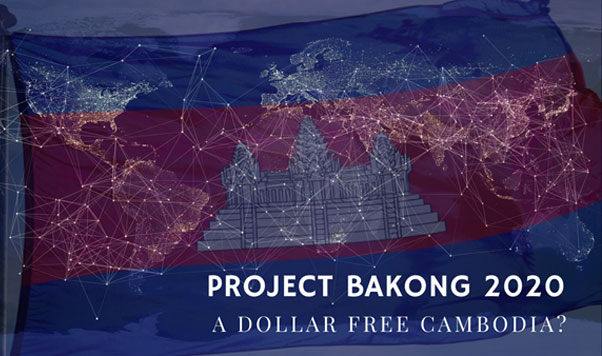Project Bakong 2020 - A Dollar Free Cambodia?
Updated On : july 2020
Project Bakong, the upcoming blockchain-based payment system is set to disrupt the dollar's supremacy in Cambodia. The National Bank of Cambodia revealed the technical details of the project last month in a white paper, as it gets ready to go ahead with Project Bakong.
The central bank has been building Project Bakong since 2017, and views this quasi-digital currency project as a high-technology revamp of the Cambodian official currency, Khmer Riel, for the locals who have favoured the U.S. dollar for decades.
According to the central bank, Bakong will help challenge the dollar's reign by encouraging Cambodians to pay through QR codes and a mobile app, with a Hyperledger Iroha blockchain which will allow real-time fund transfers between e-wallets connected to their bank accounts.
Bakong started in 2017 with a number of alternative technologies and their applications in the payment system explored and tested. Among them all, DLT was selected as it was believed to be more efficient, more reliable and very resilient to cyber-attacks than the current payment systems.
With Bakong, all financial institutions and payment service providers will be connected under a single payment platform allowing fund transfers to be processed on real-time basis without the need of a centralized clearing house. Bakong's extended feature (P2P) allows end-users to carry out real-time retail fund transfers using its all-in-one mobile payment and banking application. The application enables them to transfer funds easily by scanning QR codes, keying in phone numbers, or by just selecting from their contact list. It also allows to easily deposit funds to any accounts within the Bakong's network of participating banks.
According to the central bank, "Since banks and individual users are now brought into one DLT platform both banks and users no longer face interconnectivity and interoperability problems."
Features of the App:
- The application can be downloaded from the app store or market and users can register with their preferred participating banks or PSIs in order to have a Bakong account and participant's bank/institution account.
- The participating banks are responsible for carrying out the KYC / Anti-Money Laundering ("AML") procedures for their users, storing their information and managing their Bakong accounts.
- The participating banks shall have a Bakong settlement account at NBC.
- A user's balance in a Bakong account is considered as cash equivalent, and it should be recorded in the participant's Bakong settlement account at NBC. The balance is subject to update at the end of each business day.
- Under Bakong, end users have two separate accounts for KHR and USD to allow for transactions in the respective currencies.
- A conversion or transfer from one currency to the other is not possible on the system. However, the participating banks can provide FX service to end users.
Benefits of Bakong:
- Since transactions on the Bakong platform is carried out on a peer-to-peer basis and without a centralized clearing house, the time taken for each transaction is similar to the time taken on other real-time payment systems.
- Without the clearing process between banks eliminated, the need to invest in a centralized clearing system infrastructure is eliminated. It also saves time which is an advantage over other retail payment systems.
What Bakong will facilitate?
- Bakong is meant to be a mechanism of promoting cashless payment in a digital economy.
- The payment system will be made easily available and convenient for the unbanked population of Cambodia.
- To promote access to financial services for the unbanked population, institutions may invest at low-cost in Project Bakong to expand payment services through smart devices.
- The Bakong initiative will attract the Cambodian youth to explore new and advanced technology offering low-cost, secured, fast, and convenient payment services.
- Bakong will also help to increase access to financial services to the rural population with the expansion of agent banking and a customized platform for agent to extend the services.
- Bakong focuses on the modernization of infrastructure to meet the market demand and the needs of the customer.
In the past, Cambodian officials have not been keen to recognize the fiat-backed Project Bakong as a central bank digital currency (CBDC). The fact that users have to load Riel into their Bakong accounts before they can transact with others, shows how diverse it is from a natively digital CBDC.
The white paper stated that Bakong as a CBDC could help achieve financial inclusion, improve inefficient payment systems and even decrease poverty by opening access.
Moreover, the demographically-young and tech-savvy population of Cambodia will most likely boost Bakong adoption, according to the bank. The paper points out that, Cambodians are frequently running their financial lives through their phones. For example, e-wallet accounts in the country rose 64% in 2019 to create a record of 5.22 million users.
Hence, mass acceptance and adoption of Bakong may grant the Central bank of Cambodia much more control over Cambodia's monetary policy by destroying the dollar's decade-long local hold. While bank officials are swiftly moving towards ousting the U.S. dollar, in a move some time back, the Central Bank of Cambodia declared plans to phase out $1, $2, and $5 banknotes by the end of August.
With the technological and operational tests that went into the development of Bakong, NBC is confident about the success of this new generation payment system using the blockchain/DLT technology. The NBC will also collaborate with interested participants to bring the effective and cyber-resilient payment system out of this project. So, with Project Bakong finally underway, how long will it be till the dollar is phased out, is something only time will tell.


Comments :